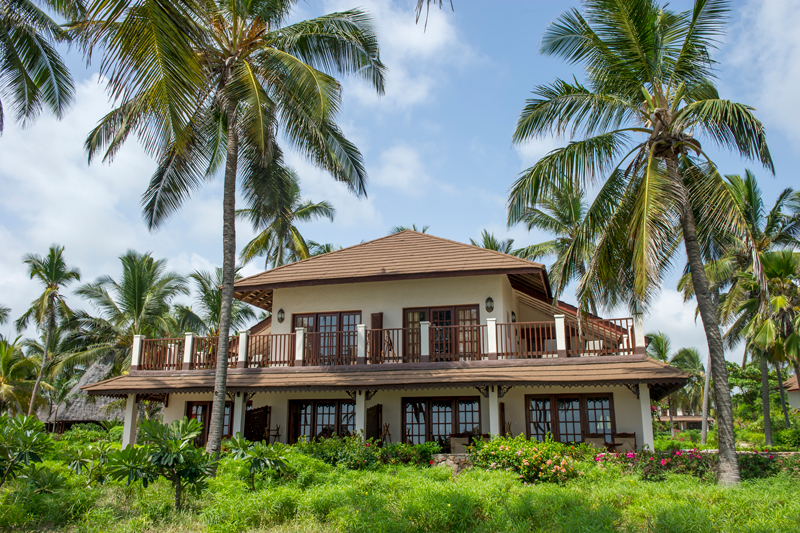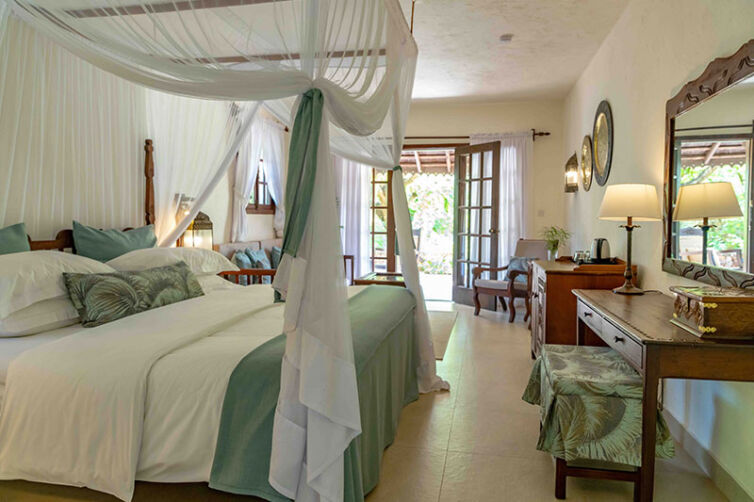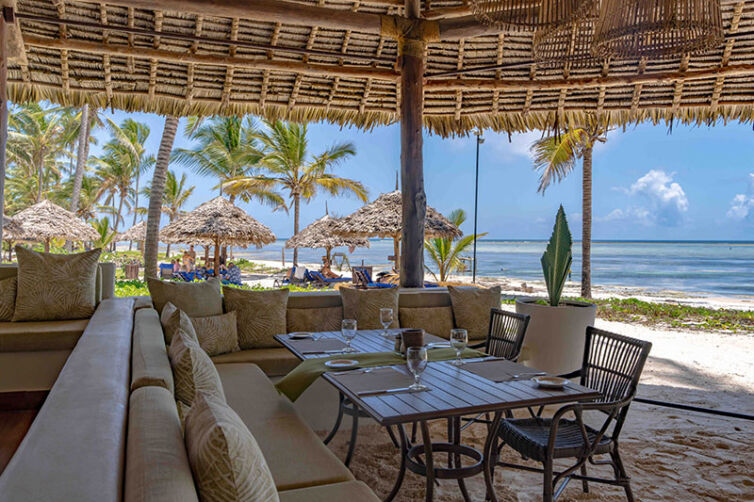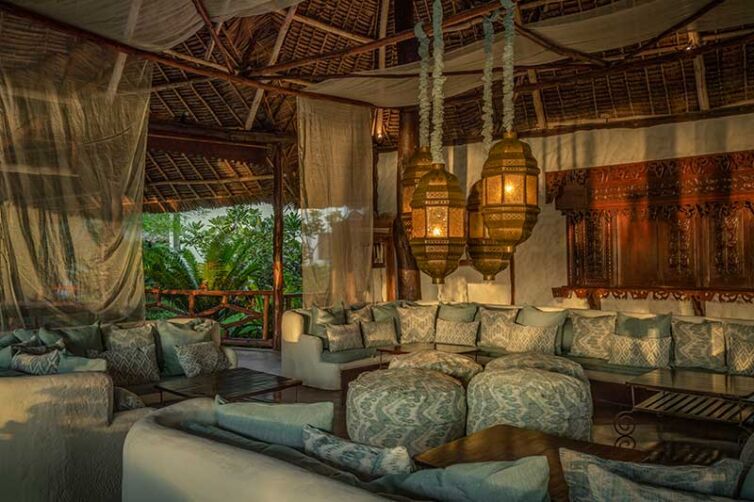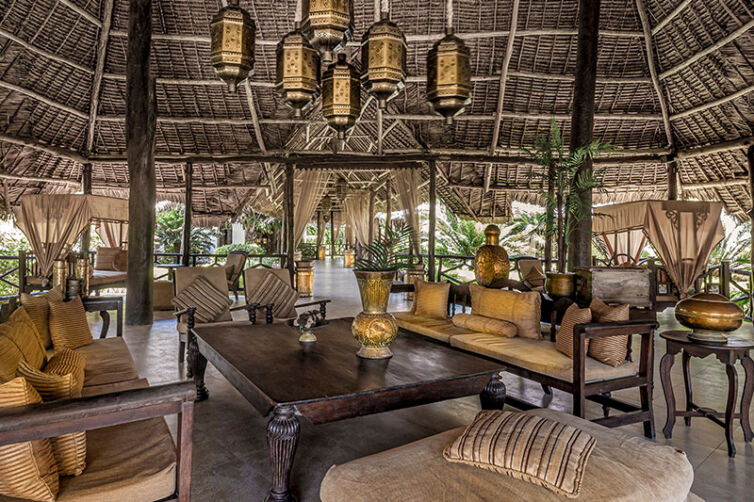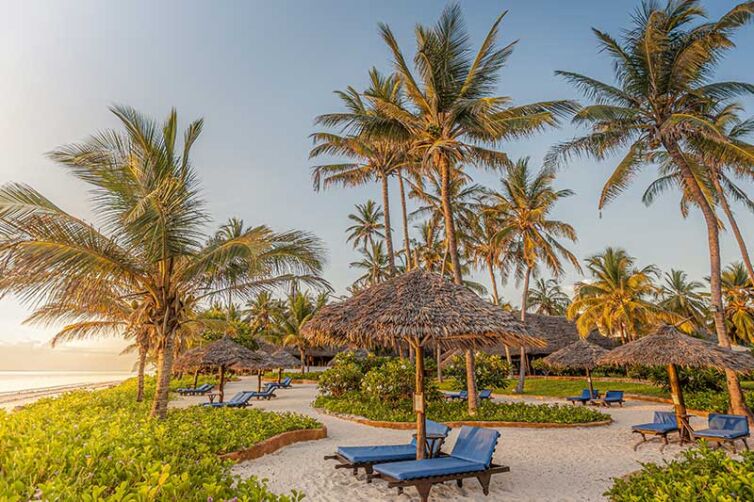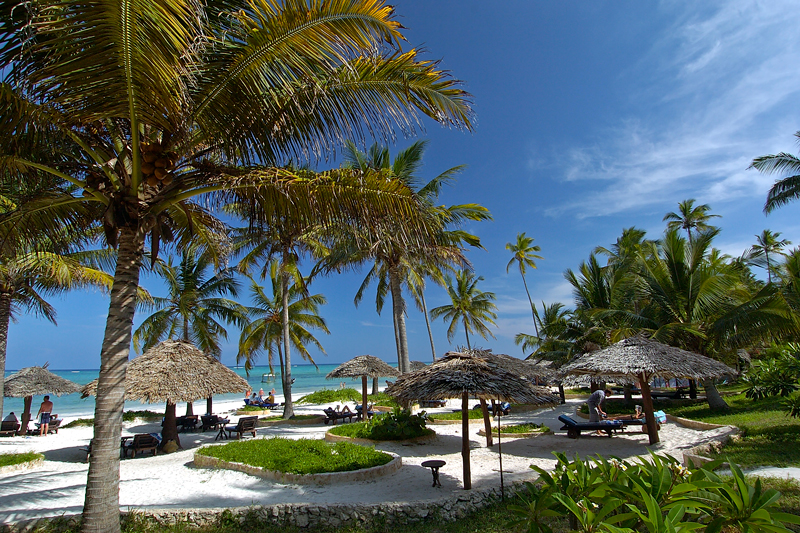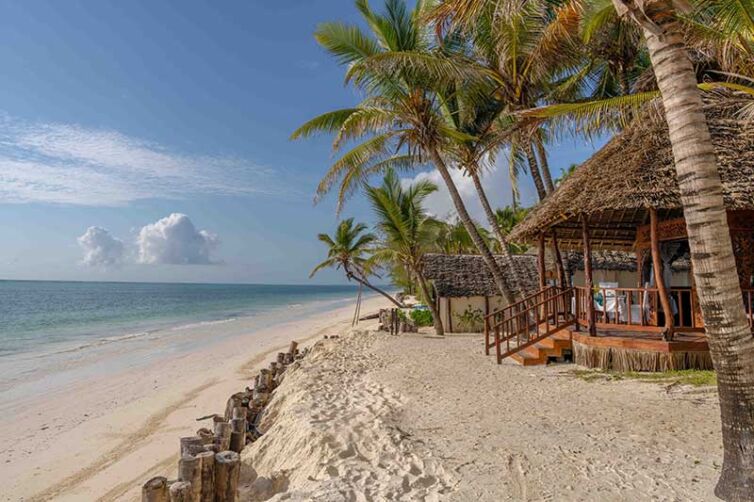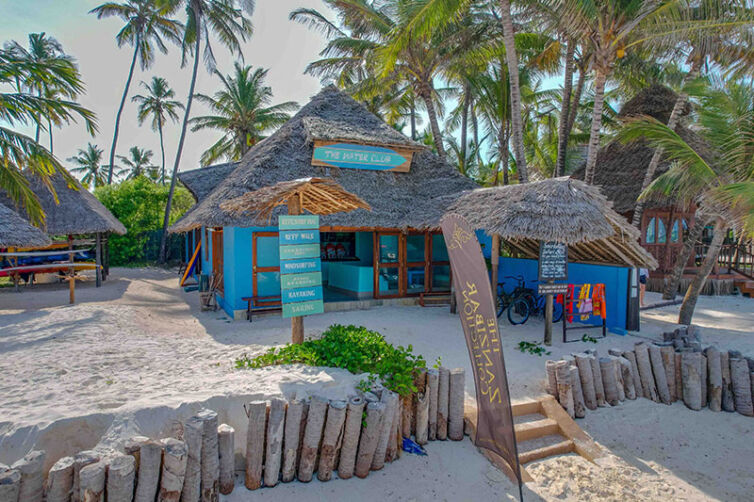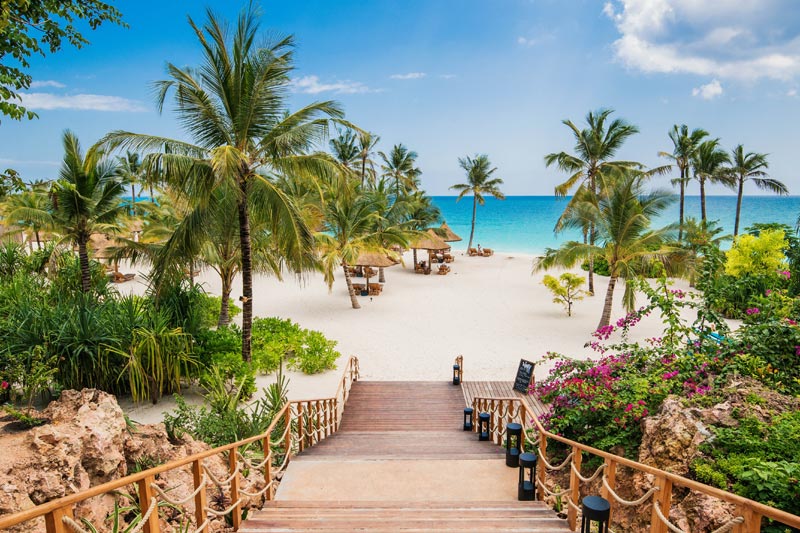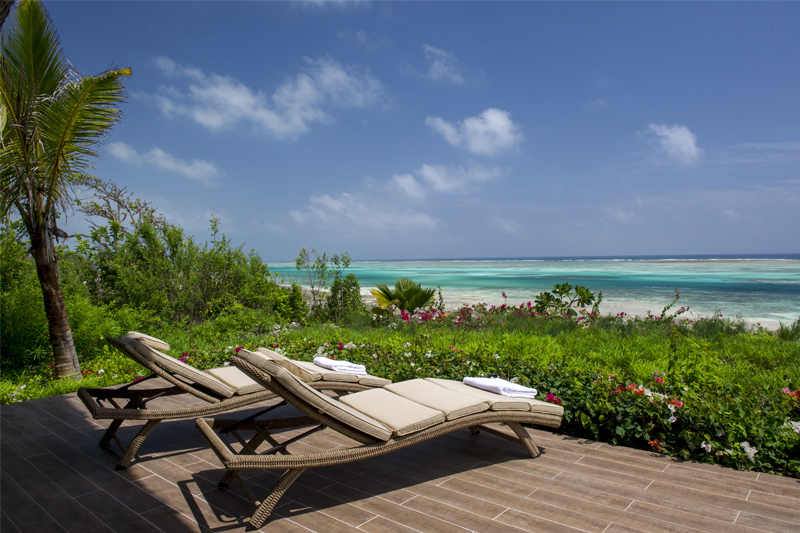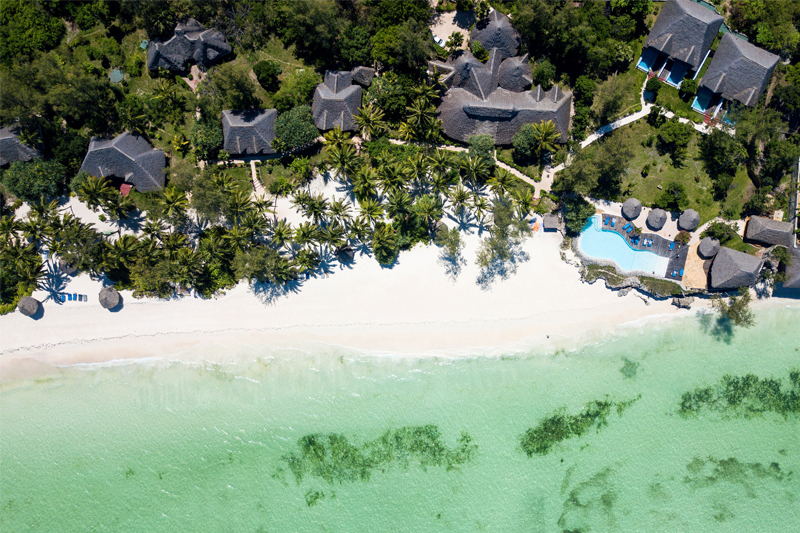Breezes Beach Club & Spa
Breezes Beach Club is a resort hotel near the village of Bwejuu on the south-east coast of Zanzibar.
Breezes is an excellent resort hotel which is not as large as some others in its category and therefore offers a more personal and discerning overall experience. Sitting firmly as an excellent 4 star property, Breezes offers very comfortable accommodation, lovely gardens, good food (as is often the case with beach hotels, buffet dinner can get a bit hectic), friendly service and a wonderful beach location. There are of course smaller, more five star options on Zanzibar, but they are all considerably more expensive. Breezes offers an excellent balance between quality and affordability and is consequently a popular choice for honeymooners, families or couples seeking a good all round 4 star beach experience.
Rooms
Accommodation is provided in 40 Deluxe Rooms and 20 Suites. The rooms are situated in the pretty gardens in two-storey clusters of four rooms (some have views through the vegetation towards the sea but no rooms have ‘uninterrupted sea views’ as such). All rooms are the same but Suites are on the first floor with large furnished balconies whilst Deluxe Rooms are on the ground floor with terraces. Some of the Deluxe Rooms are interleading which are ideal for families. All rooms have an en suite bathroom, an electronic room safe, hairdryer and tea and coffee making facilities.
Central Areas
Dining options include the main Salama Restaurant (which serves buffet breakfast and dinner) and the ocean front Breakers Grill (serving lunch). The Tides can be booked at a supplement for beachfront private dining. There are several bars, low-key evening entertainment and the Chai Lounge which serves afternoon tea in the lounge. The Frangipani Spa offers a range of treatments and massages and there is a boutique. There is also a fitness and aerobics centre, a flood-lit tennis court and a lovely large swimming pool.
Facilities
Wi-Fi – Yes
Power for Charging – Yes
Swimming Pool – Yes
Habitat & Wildlife
Zanzibar’s, or more correctly Unguja’s (Zanzibar is the name of the archipelago which includes both Pemba and Unguja islands), history dates back more than 2000 years when the islands traded with ships from Persia, Arabia and India. From about the 10th century, groups of immigrants from Shiraz (Persia) settled on the island and mixed with the local people. In the 16th century, the Portuguese established a trading station before being ousted by Omani Arabs a couple of centuries later. In 1840, the Sultan Said moved his capital from Muscat to Zanzibar with the Omani Arabs forming an elite group of landlords and rulers. Indian settlers formed a merchant class and the island became an important centre of regional politics and the focus of the slave trade.
In 1890, Zanzibar became a British protectorate before gaining independence in 1963. In 1964, the Sultan was overthrown and nearly all Arabs and Indians expelled. Later that year, Zanzibar and Tanganyika combined to form Tanzania. Since then, many of the expelled peoples have returned.
In Zanzibar’s Stone Town (the old quarter and a UNESCO World Heritage site), a fascinating maze of narrow streets and alleyways lead past numerous old houses, mosques, ornate palaces, shops and bazaars reflecting the various influences through the ages – Arab, Persian, Indian and European. Many of the buildings date back to the 19th century and depict the wealth of its builder. Arab houses have plain outer walls with large doors leading to an inner courtyard. Conversely, Indian houses have a more open facade and large balconies with railings and balustrades. Take the chance to savour the atmosphere by dining at one of the rooftop restaurants.
The area outside the Stone Town is called Michenzani (New City), a failed attempt at becoming a modern city.
Depending on where you are staying on the island, there are a number of interesting excursions to consider. Visit a Spice Plantation, take a trip to the Jozani Forest (southern part of the island) where the rare red colobus monkey is found or visit Chumbe Island Coral Park (either as a day trip from Stone Town or overnight). Sundowner trips by traditional sailing dhow are available out of Stone Town. Due to environmental concerns, we no longer recommend swimming with dolphins.
Please remember that Zanzibar, like much of the East African coastline, has a strong Islamic culture, and that you should dress appropriately when in public areas and the Stone Town. During the month of Ramadan, further courtesy should be shown to those observing their faith, particularly in respect to service which you may find slower than usual.
The best beaches on the island are those found on the north and east coasts. However, please note that there are large tidal movements and sea swimming from most beaches during low tide is difficult. The best snorkelling is found around the Mnemba and Chumbe islands, but snorkelling is available along the length of the east coast where it is usually necessary to go out by boat to enjoy the best locations.
Like most of East Africa, the islands are affected by the monsoon winds – the Kuzi (or sometimes Kisi) which blows from April to September/October is a south-easterly which brings choppy sea conditions and seaweed to the shorelines, whereas the Kaskasi blows from the north-east from October/November to March producing calmer seas and slightly higher temperatures.
Activities
Breezes offers scuba diving through its own Rising Sun Dive Centre and caters for all level of divers from total beginners to professionals. Snorkelling trips are also possible. In addition to a gym and Frangipani Spa, there is a comprehensive water sports centre offering beach activities, cycle hire, sailing, paddle boards, kayaks, reef walks, kite-surfing and windsurfing. The hotel also offers standard Zanzibar excursions including dolphin tours to Raz Kizimkazi (an over-crowded experience), Jozani Forest where you may catch sight of the Zanzibar red colobus monkey, Spice Farm Tours and day trips to Stone Town.
Seasons
Breezes is open all year round, though Zanzibar is best avoided during the main rainy season in April and May.
There is no age restriction at Breezes and the hotel is a natural choice for families seeking a 4 star beach experience in Zanzibar. There are some bungalows that do have interconnecting rooms for families.
The Zanzibar Collection, owners of Breezes, gives employment and training to those within the local communities. Around 90% of the staff are graduates of the local hotel school and have been taught life skills that they can carry with them throughout their future in tourism. They also employ a marine biologist specialising in conservation and run a programme for all staff members to educate them on manging the ocean and understanding its resources.
The Collection supports a maternity and children’s clinic in the village of Bwejuu and run the Baraza for Bwejuu charity which works to uplift the lives of those from the village through such means as supplying fresh water and medicine, donating school supplies and assisting in the building of a mosque. Each year staff from Baraza, along with another charity, clean the beaches and villages and repaint the clinic. They also organise football matches between local villages, donate balls and present prize money to both the winning and runner up teams which then goes back into their communities.
Breezes do not take their water from the source at the village, leaving that for the community, but instead use a local desalination plant. They obtain as many supplies as possible locally and fisherman bring their fresh fish to the resort. They also have a garden to grow local vegetables.
To minimise the usage of single use plastic bottles at Breezes, drinking water is served in carafes refilled from recyclable water containers and the Collection is currently developing its own water bottling plant.
Much of the interior items at Breezes have been made by local craftsmen and women using traditional skills, supporting the communities through income and also using recycled materials instead of creating waste.






